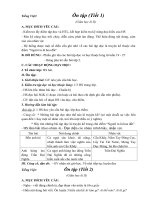Tài liệu ôn luyện aptis kỹ năng viết
Bạn đang xem bản rút gọn của tài liệu. Xem và tải ngay bản đầy đủ của tài liệu tại đây (19.82 MB, 67 trang )
'
,..
-
TAP
THI APTIS
TAI LIEU
ON LUYEN
•
•
•
-.
-.
KY NANG VIET
HAND-OUT 1
Formal and Informal Language
In order to write clearly and accurately you need to identify the difference
between formal and info1mal English. Here is a list of some of the most
characteristic features that differentiate formal and informal English.
Formal
• Words of Latin/French origin
residence
Informal
• Words of Anglo-Saxon origin
home
• Single-word verbs
to arise
to mount I to board
• Formal Connecting words
In addition, furthermore
However, on the other hand,
There ore, conse uently
• Phrasal verbs, idioms with get
to get up
to et on
l
\
•
Informal connecting words
(
And
But
So
• Active constructions
• Impersonal constructions
They say that
it is /ctid that
.
they've put the price up
JU/. JR"'
the price has been in.czeas.f�d--�·
ftf 111JWJ1.
you never know
one never knows
you can argue
tJJfJ
-·--. - J I. it can be a�{)N1
£;."
(/
• Modal verbs, adjectives, clauses etc
Can people be happy when they
haven't got a job?
When the bits everyone was getting
wrong had been explained ...
• Abstract nouns
Is happiness possible during
unemployment?
After clarification of the problem areas..
• Not ending with prepositions; use of
whom
To whom were you speaking?
• Complex sentences
The student, who was late for class,
s rinted across the ound.
• Use of inversions for conditionals and
emphasis
Should you require further information,
please contact ...
• Ending with prepositions
Who we;e you speaking to?·
• Simple sentences
The student was late for class. He
s rinted across the ound.
• Inversion so�etimes used for
emphasis
Only then did I realise ...
No contractions in writing
I will, we would
r·,
\
• Contractions is writing
I'll, we'd
1
/
.,.









